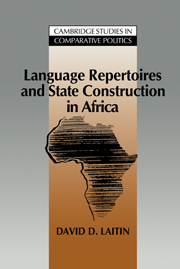Book contents
- Frontmatter
- Contents
- Preface
- PART I LANGUAGE REPERTOIRES AND THE STATE
- PART II SOCIOLOGICAL AND POLITICAL FORCES DESCRIBED
- PART III STRATEGIC THEORY APPLIED
- 6 Strategic theory and Africa's language future
- 7 Case studies from independent Africa
- PART IV CONCLUSION AND POLICY RECOMMENDATIONS
- Notes
- References
- Index
6 - Strategic theory and Africa's language future
Published online by Cambridge University Press: 03 May 2010
- Frontmatter
- Contents
- Preface
- PART I LANGUAGE REPERTOIRES AND THE STATE
- PART II SOCIOLOGICAL AND POLITICAL FORCES DESCRIBED
- PART III STRATEGIC THEORY APPLIED
- 6 Strategic theory and Africa's language future
- 7 Case studies from independent Africa
- PART IV CONCLUSION AND POLICY RECOMMENDATIONS
- Notes
- References
- Index
Summary
What sort of nation-states will be characteristic of Africa in the coming century? Will they follow in the footsteps of their western European and east Asian predecessors and develop language communities commensurate with political boundaries? If so, will the rationalized languages be those of the overseas conquerors, like in the Americas and Oceania; or will they be indigenous, as in Indochina? Or is the multilingual model of Switzerland or the Soviet Union more applicable to the African states of the future? And if multilingual, what sort of language demands will such a state put on its citizens? What sorts of language repertoires will be necessary for Africa's future citizens if they hope to take reasonable advantage of opportunities available in their country? In this chapter, some preliminary answers are provided.
In formulating these answers, I shall seek to avoid two methodological and ideological errors. The first is to examine Africa as if it were a continent marked only by distinctiveness. I have therefore sought, as have many others, to integrate African studies into a comprehensive world history. In political linguistics, it is too often assumed that, due to the extreme heterogeneity of society within the boundaries of African states and the very arbitrariness of African state boundaries, African nation builders have had a historically unique set of constraints facing them in the development of a coherent language policy. My politicallinguistic vignettes of France, Spain, and Japan in Chapter 1 demonstrate, however, that in early periods of state building among states that are now linguistically rationalized, there was considerable language heterogeneity.
- Type
- Chapter
- Information
- Language Repertoires and State Construction in Africa , pp. 103 - 119Publisher: Cambridge University PressPrint publication year: 1992

